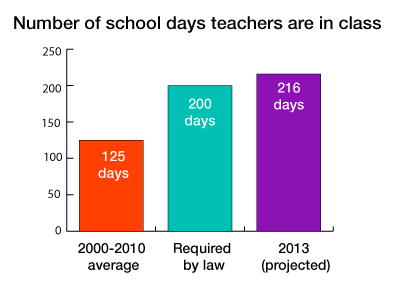Lea este post en español.
Meet 10-year old Betsai (pictured in the orange collared shirt). He is a small boy, with a big personality, who goes to the public school in the town of Quebrada Larga in Honduras.
drawing on articles from the forthcoming
Global Corruption Report: Education.
Since kindergarten he’s received about half the amount of school days that are dictated by law, because his teachers often don’t show up for class – and when they do, they arrive late. He is a bright boy, but there’s little chance he’ll one day be able to compete for jobs in Honduras, or around the world, when he only learns half the arithmetic, half the reading, and half the writing that he is supposed to.
Betsai’s problem is replicated all over Honduras, where the average number of school days from 2000-2010 was just 125, instead of the 200 required by law. This problem is already producing frightening results: Honduras spends the highest percentage of its GDP on education in the region, but has the second lowest test scores.
The anti-corruption coalition Transformemos Honduras (TH), which is led by the Asociación para una Sociedad más Justa – Transparency International’s chapter in Honduras – is trying to change this, and it is seeing results.
Starting in 2010, TH investigated corruption and negligence, including teacher absenteeism, in the Honduran public education system, published the results in the media, and equipped Honduran parents to get involved in their children’s education by asking them to count the number of days that their children receive classes, among other indicators.
At first, the government was slow to respond, but in February 2012, in part due to pressure from TH, the Honduran President named a new Minister of Education. He came in ready to take on the education system and asked TH to ally with him in the fight against corruption.
The Minister required all teachers to use an online system to register that they are in their classrooms, and 59,788 of the country’s 60,000 teachers have already done so. He’s also become strict on teachers missing classes. If they miss more than three days without justification, they are called to a hearing and can be fired.
Recently, Betsai’s grandmother (wearing glasses in the photo), who is in charge of monitoring the number of days that teachers give classes at his school, reported how things were going, “Oh my goodness! You should see the school this year. It’s completely different. Teachers show up on time, and they’re teaching on Saturdays, just like they’re supposed to.”
This year, Honduras’ public school system has scheduled 216 school days, and so far, only three have been missed – putting schools on track to provide more than 200 school days for the first time in a decade.
TH is not just focused on the number of days teachers are in the classroom; it is also working with the government and parents to ensure education quality. It is auditing teacher qualifications and testing. It also publicised a suppressed government report on illegal teacher pay bonuses and is investigating teachers on the payroll who are not in the classroom.
Together parents and students, government officials, and TH are working towards a more transparent and efficient education system.

















 Connect with us on Facebook
Connect with us on Facebook Follow us on Twitter
Follow us on Twitter